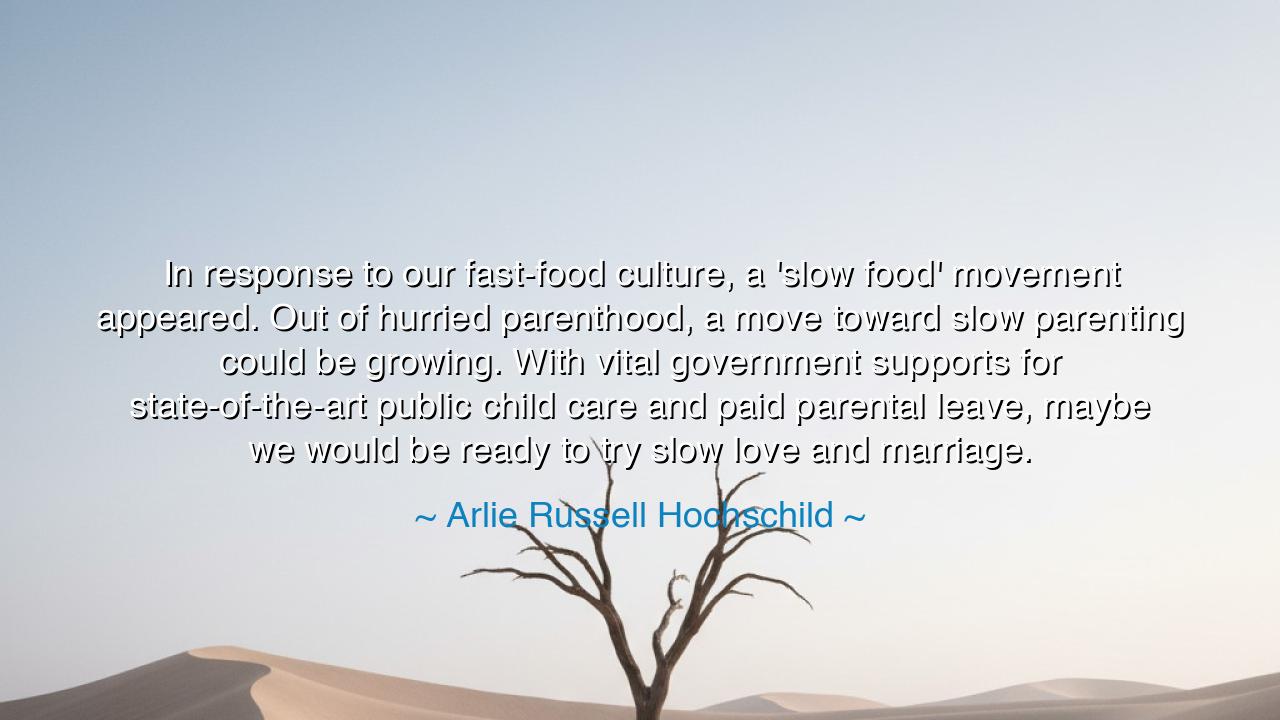
In response to our fast-food culture, a 'slow food' movement
In response to our fast-food culture, a 'slow food' movement appeared. Out of hurried parenthood, a move toward slow parenting could be growing. With vital government supports for state-of-the-art public child care and paid parental leave, maybe we would be ready to try slow love and marriage.






In the words of Arlie Russell Hochschild, we hear a reflection upon the rhythms of our age: “In response to our fast-food culture, a ‘slow food’ movement appeared. Out of hurried parenthood, a move toward slow parenting could be growing. With vital government supports for state-of-the-art public child care and paid parental leave, maybe we would be ready to try slow love and marriage.” These words are not a casual observation, but a vision—a call to resist the tyranny of haste that corrodes the deepest bonds of life. Hochschild speaks as one who sees not only families, but entire societies, rushing forward, never pausing to savor the sacred.
The ancients warned us of this peril. The Greeks told of Kronos devouring his children—a symbol of time consuming all it touches when not ordered with wisdom. The prophets of old cried out against a people who hurried after gain, forgetting mercy and rest. The sages of the East taught that rushing destroys harmony, for the bamboo grows not by force but by season. In every tradition we hear the same truth: speed without reflection leads to hunger of the soul. Thus, just as the slow food movement rose to reclaim the savor of the earth’s bounty, so too does Hochschild imagine a return to savoring love, marriage, and parenting.
History gives us an example in the Roman matron Cornelia, mother of the Gracchi brothers. She was not hurried in her care, though Rome itself was a place of political frenzy. She gave her children her time, her patience, and her undistracted presence. When others displayed jewels, she pointed to her sons and said, “These are my treasures.” In this story, we see the essence of slow parenting—not measured in material gifts, but in the richness of time and attention. Her legacy endured not because she rushed, but because she dwelt deeply.
Hochschild also connects this vision to society itself. She reminds us that love and family are not nourished in isolation, but are sustained by the structures of a just community. Paid parental leave, public child care, and collective supports are not luxuries—they are the fertile soil in which slow love and slow marriage can grow. Without them, parents are forced into haste, marriages are starved by exhaustion, and children are left hungry for attention. A society that values only speed will reap only weariness; but a society that makes space for care will reap strength across generations.
The lesson here is both personal and communal. Personally, we must resist the pressure to rush our families as if they were projects to be completed. To practice slow parenting is to listen longer, to walk with our children without agenda, to allow them to bloom in their own rhythm. To practice slow love is to remain patient with a spouse, to build bonds not in haste but in quiet faithfulness. But communally, we must also labor for policies that defend time—time for parents to be present, time for families to dwell together, time for love to grow. Without such structures, even the most devoted heart may be crushed by endless toil.
What, then, must we do? First, let us cultivate slowness in our homes: shared meals without screens, conversations without hurry, embraces without clock-watching. Second, let us support the labor of justice: calling for parental leave, for child care, for protections that honor family as sacred. Third, let us remind ourselves that love, like a vineyard, does not flourish when rushed, but when tended patiently over time.
O seekers of wisdom, remember this: a culture of haste breeds hunger that no abundance can fill, but a culture of slowness gives birth to joy that no scarcity can destroy. If we dare to move slowly—in our food, our parenting, our marriages, and our loves—we may yet recover what the world of speed has stolen.
Thus Hochschild’s words endure as prophecy. The slow food movement reclaimed the taste of earth; let us now reclaim the taste of love. The hurried heart knows only exhaustion; the slow heart knows joy. And so the teaching remains: let us walk, not race, in the sacred paths of parenting, of love, and of marriage, and in this walking find the fullness of life.






AAdministratorAdministrator
Welcome, honored guests. Please leave a comment, we will respond soon